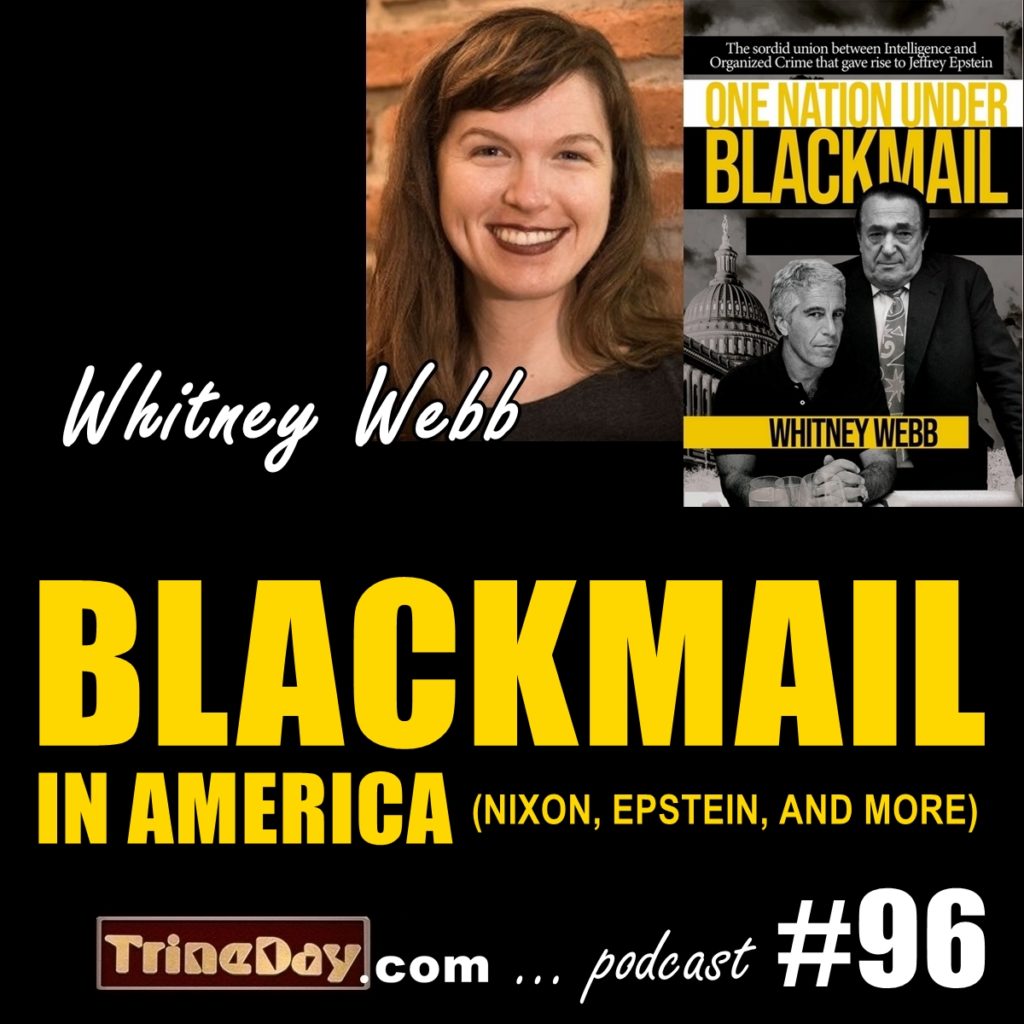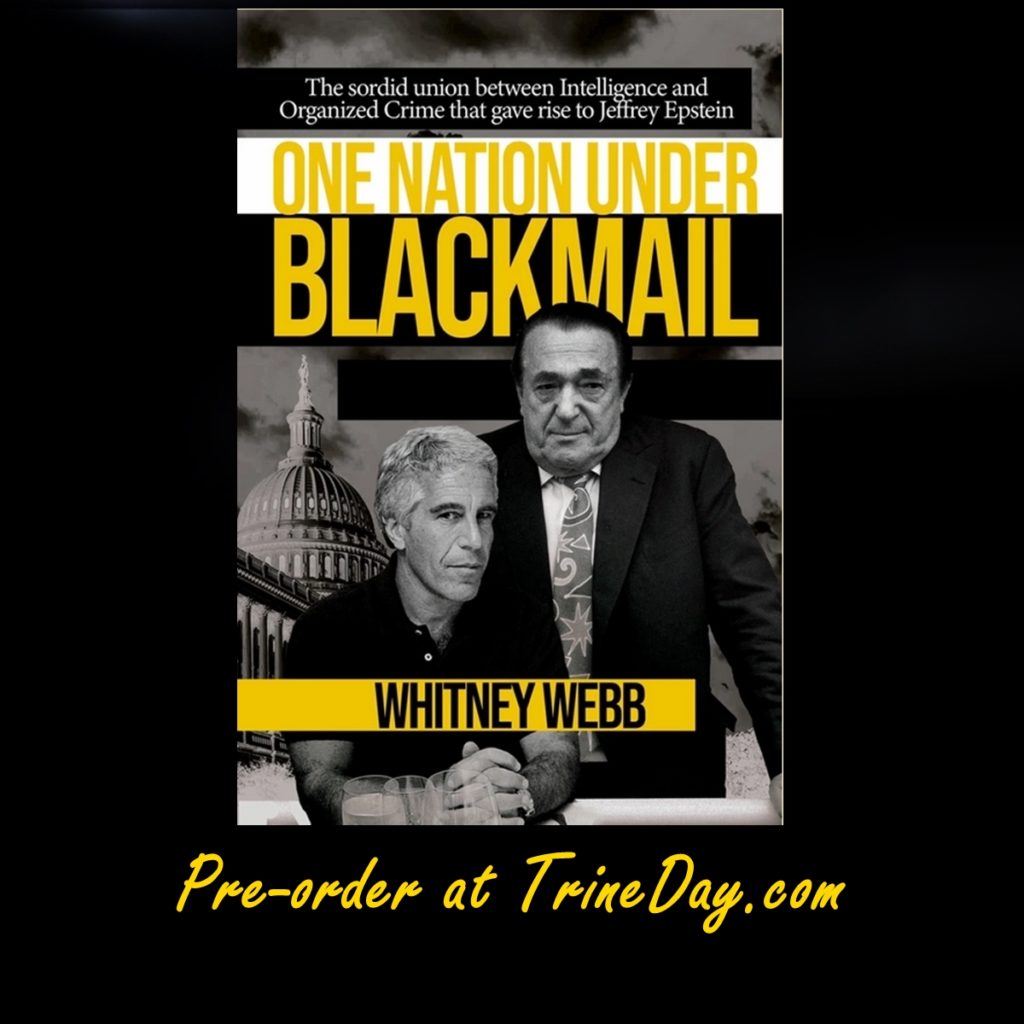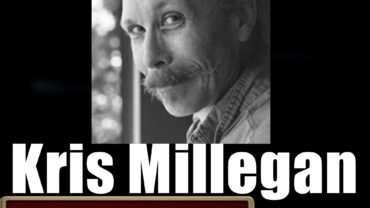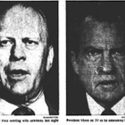The Journey 96. Whitney Webb: Blackmail In America (Nixon, Epstein, And More)
Publisher Kris Millegan speaks with Whitney Webb about blackmail, organized crime and Israel, Richard Nixon and the Dulles brothers, and her upcoming book, ONE NATION UNDER BLACKMAIL: THE SORDID UNION BETWEEN INTELLIGENCE AND ORGANIZED CRIME THAT GAVE RISE TO JEFFREY EPSTEIN.

Kris: We are having to delay the release of Whitney’s book. It mostly has to do with problems in supply chain in publishing. We’re having to move Whitney’s release to September 22. I’ve been getting the chapters. It’s a deep and wonderful dive … into the deep underground so you can see the continued use of blackmail to affect our lives.
Whitney: The span of the book really goes back to the 1920s and goes through the early 2000s. A lot of the same people, the same associations, and the same patterns of activity in terms of criminal rackets or financial fraud, the same patterns and individuals pop up over and over again through the decades. It’s very coordinated. There are a lot of recurring themes. The trafficking of arms. This particular network has been very involved in that for decades and decades and decades.
K: These same people were also involved a lot with drugs. There are several different groups in the quote-unquote shadows working together. When they start merging with the intelligence groups, it gets really kind of spooky. When you have some of these groups that are able to command parts of the United States government to do things, it gets really, really hairy.
When you take the power of criminal gangs, the mob, and intelligence agencies, and then you get sovereign countries that have different agendas, and you have what I call secret societies, too, involved in this mix, it’s quite a brew.
W: Ever since organized crime and intelligence agencies got together in earnest several decades ago, [they splinter into factions now and then], developing rivalries with each other, even if they agree about certain things or engage in certain types of criminal activity or share similar end goals or a similar endgame. Iran-Contra is a really good example.
The Oliver North level of that was nicknamed “The Enterprise.” There seemed to be another organization similar to it but more tied up with then Vice President George H. W. Bush that was called “The Supermarket.” “The Enterprise” was more tied up with William Casey, who had a rivalry with Bush going back several years before Casey ever became CIA Director. Of course, Bush had been CIA Director before [Casey].
You have so many different characters with different allegiances, and those allegiances to these particular factions can change over time. To take Jeffrey Epstein as an example, it looks like he started off in some of these Iran-Contra networks but ended up getting involved with a rival faction to them that historically had been called “The Internationalists,” sort of allied with the Rockefeller family, David Rockefeller and Co.
Epstein ended up, throughout the 90s, going sort of in that direction, getting involved with groups like the Council of Foreign Relations and the Trilateral Commission. In one of Epstein’s contact books from the 90s, David Rockefeller is there with several numbers, as are the offices of the Trilateral Commission and things like that.
A lot of the individuals I chart early in the book are very involved with McCarthyism, quote-unquote anti-communism activities. People like Roy Cohn and J. Edgar Hoover, who were very adept at the use of blackmail. And there are a lot of overlaps with that particular network and Epstein at the beginning. But he seems to have branched off and gotten sort of involved with more than one faction. I think the fact that he went from one faction to another sort of soured one faction against him and may have played a role in his eventual downfall.
K: Within Israeli intelligence you have factions. How do you look at Israeli intelligence in some of this?
W: As one example, Netanyahu. He was Israeli prime minister for a very long time. He came to power in 1996. His main bankrollers were people from New York, mainly like Ronald Lauder, of the Este Lauder fortune. And that particular family very much associated with Roy Cohn, Donald Trump. That sort of New York nexus. And he essentially bankrolled Netanyahu.
But several decades later, I think in the Trump era, Ronald Lauder turned his back on Netanyahu and sort of withdrew his support. It’s sort of a transnational oligarchy that’s able to exert a lot of influence on Israel specifically. If you look at the beginning of the rise of Israel, you also have organized crime being very involved with the ability of Israel to even exist as a state.
Israel was established through a war that took place in 1948. Supposedly, the US wasn’t going to provide arms to that conflict under Truman. So essentially what happened is that major figures in American organized crime were funneling large amounts of weapons to Israel, often with the cooperation of other people that were in legitimate businesses. You had people like Busy Siegel, Meyer Lansky. Some of the biggest names [in organized crime] involved.
K: Some other blackmail out there – there’s a book called “The Witness” by John Loftus and another gentleman. It tells the story of John Foster and Allen Dulles’ sister and how she basically blackmails her brothers so the US vote in the UN recognizes [the new state of] Israel.
And there’s another case of blackmail of the Dulles brothers. How Nixon got into politics. He was a lawyer for the Navy at the end of World War II. [He found information about] the Dulleses financing the Nazis. And also their bringing back thousands of Nazis [into America] against direct written orders by Harry Truman. So Nixon was blackmailing the Dulles brothers. That’s been something that has reverberated through American history. Because Nixon then became this big part of the narrative.
Blackmail has been a very important part, a sad part of American history.
W: A sad and largely unknown part of American history for the majority of Americans, I think it’s safe to say.










